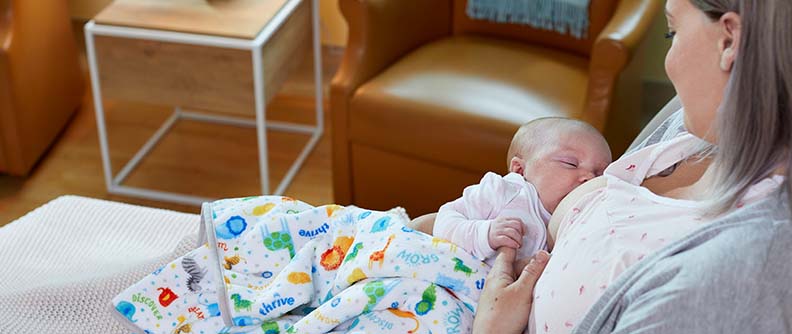There’s a lot to figure out after bringing your new baby home. What works for others might not be right for you. Don’t worry, you’ll soon develop a routine that works for your family.
Here are a few things to remember:
Bonding with your baby
The first few weeks are a very important bonding time for you and your baby. You might want to limit visitors so that you can have as much one-on-one time as possible. It’s also fine if you are able to have some people around to help with chores, run errands, and watch other children in the home.
You can start bonding with your baby by:
- Gently touching and massaging them.
- Holding them as much as you can.
- Talking, singing, or reading aloud to them.
Breastfeeding/chestfeeding tips
You will begin learning how to breastfeed/ chestfeed while still in the hospital. When you come home, you can breastfeed your infant whenever they seem hungry.
It’s normal for babies to eat anywhere from 8 to 12 times in a 24-hour period. Some babies eat in clusters for the first several weeks. Later on, they’ll find a better rhythm and feedings will be more spaced out.
Breastfeeding offers several benefits for you and your baby. It helps them stay healthy, lowers their risk of infection, and strengthens their immune system.
You’ll bond with your infant while you’re breastfeeding. It also helps you recover from giving birth, lowers your risk of certain diseases, and may help you lose pregnancy weight more easily.
Formula feeding
If you choose to formula feed your baby — or if there is a medical need to do so — there are a few important things to keep in mind:
- The US Food and Drug Administration (FDA) regulates all commercial infant formulas to make sure they are safe and meet minimum nutrition standards. When choosing a formula, remember these tips:
- Make sure it is not expired.
- Make sure the container is sealed and in good condition. If there are any leaks, puffy ends, or rust spots, do not feed the formula to your baby.
- Be sure it is not labeled for toddlers.
- If you’re using powdered formula, carefully read all the mixing instructions. It’s important to use the correct amounts of formula and water to ensure your baby is getting the right nutrients. Never dilute formula with more water than directed.
- When preparing a bottle, make sure you have clean hands and sanitized bottles.
- To warm the formula, run the bottle under warm water. Avoid using the microwave because it can make the formula too hot and burn your baby’s mouth or throat.
If you have any trouble finding formula for your infant, be sure to contact your clinician as soon as possible.
General tips for your baby’s health
To keep your baby as safe and healthy as possible, be sure to:
- Choose a pediatrician you like.
- Lay your baby down on their back every time they sleep.
- Keep your home smoke-free.
- Stay within arm's reach of your baby while they are in the tub.
- Support your newborn’s head.
- Use an approved weight-appropriate, rear-facing car seat.
- Don’t leave your baby unattended on a changing table or other high surfaces.
When to call your clinician
If you have concerns about your infant, it’s okay to call your clinician. They are happy to answer any questions you might have about what’s happening with your baby.
Call your clinician immediately if you notice that your baby:
- Develops a cough
- Has fast, labored breathing
- Has a fever of 100.4 degrees or higher
- Makes raspy noises or their cry sounds deeper
You should make sure your baby’s umbilical cord doesn’t get infected. Signs of infection include:
- Bleeding
- Foul smell
- Pus-filled or yellowish drainage
- Redness and swelling
If your baby is circumcised, call your clinician if you notice any problems. These may include:
- A fever of 100.4 degrees or higher
- Pus-filled blisters
- Redness, pain, or swelling that doesn’t get better
- Spots of blood in your baby’s diaper that are larger than a quarter
- Yellow crusts lasting longer than seven days
